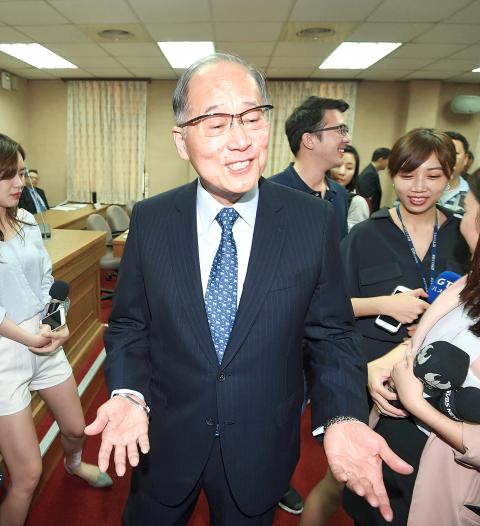Beijing has spurned Taipei’s attempt to communicate about its bid to join the World Health Assembly (WHA) this year, but a delegation is prepared to interact with other nations on the sidelines of the meeting in Geneva, Switzerland, even if Taiwan fails to secure an invitation, the Mainland Affairs Council and Ministry of Foreign Affairs said yesterday.
Taiwan did not receive an invitation from the WHO by Monday’s deadline for online registration due to Beijing’s objections. The WHA is being held from May 22 to May 31.
The council tried on March 23 and May 1 to communicate with Beijing via official and non-official channels, including text messages, faxes and telephone calls, but China did not respond, Mainland Affairs Council Deputy Minister Lin Cheng-yi (林正義) said at a question-and-answer session at a meeting of the legislature’s Foreign and National Defense Committee in Taipei.

Photo: Fang Pin-chao, Taipei Times
“It would be against China’s hope of a rapprochement in cross-strait relations if it continues to ignore Taiwan’s rights and suppress Taiwan’s participation in international organizations,” Lin said.
China needs to understand the changes in Taiwan’s political scene and adjust its policy just as Beijing has made policy adjustments after US President Donald Trump assumed office, he said.
Prior to 2009, China opposed Taiwan’s inclusion in the WHO, but did not link its exclusion to the “one China” principle or the so-called “1992 consensus,” Lin said.
It is hoped that China could exercise the same policy flexibility toward Taiwan again, he said.
Chinese Nationalist Party (KMT) Legislator Johnny Chiang (江啟臣) asked if President Tsai Ing-wen (蔡英文) would, on the first anniversary of her inauguration, reframe her China policy with the slogan “new situation, new test paper, new model,” a move he said would not improve cross-strait ties.
Without giving a direct answer, Lin said Tsai’s anniversary speech is expected to be in line with the gist of the slogan, while the government is still observing Beijing’s reaction to it.
“We will not go back to confrontation mode and most importantly we will not cave in to pressure and stop moving forward,” Lin said of the government’s cross-strait policy.
In related news, a delegation led by Minister of Health and Welfare Chen Shih-chung (陳時中) is to visit Geneva while the WHA is meeting regardless of whether Taiwan has received an invitation, and the delegation would engage in bilateral and multilateral meetings with public health officials of “key countries” and non-governmental groups, Minister of Foreign Affairs David Lee (李大維) said.
The ministry has organized news conferences, interviews and diplomatic events in addition to a “Taiwan Night” hosted by non-governmental organizations, Lee said.
Seven “important countries” that have contributed 56 percent of the WHO’s funding have voiced support for Taiwan’s inclusion in the WHA, suggesting increased support at an international level, Lee said.

Conflict with Taiwan could leave China with “massive economic disruption, catastrophic military losses, significant social unrest, and devastating sanctions,” a US think tank said in a report released on Monday. The German Marshall Fund released a report titled If China Attacks Taiwan: The Consequences for China of “Minor Conflict” and “Major War” Scenarios. The report details the “massive” economic, military, social and international costs to China in the event of a minor conflict or major war with Taiwan, estimating that the Chinese People’s Liberation Army (PLA) could sustain losses of more than half of its active-duty ground forces, including 100,000 troops. Understanding Chinese

The Ministry of Foreign Affairs (MOFA) yesterday said it is closely monitoring developments in Venezuela, and would continue to cooperate with democratic allies and work together for regional and global security, stability, and prosperity. The remarks came after the US on Saturday launched a series of airstrikes in Venezuela and kidnapped Venezuelan President Nicolas Maduro, who was later flown to New York along with his wife. The pair face US charges related to drug trafficking and alleged cooperation with gangs designated as terrorist organizations. Maduro has denied the allegations. The ministry said that it is closely monitoring the political and economic situation

UNRELENTING: China attempted cyberattacks on Taiwan’s critical infrastructure 2.63 million times per day last year, up from 1.23 million in 2023, the NSB said China’s cyberarmy has long engaged in cyberattacks against Taiwan’s critical infrastructure, employing diverse and evolving tactics, the National Security Bureau (NSB) said yesterday, adding that cyberattacks on critical energy infrastructure last year increased 10-fold compared with the previous year. The NSB yesterday released a report titled Analysis on China’s Cyber Threats to Taiwan’s Critical Infrastructure in 2025, outlining the number of cyberattacks, major tactics and hacker groups. Taiwan’s national intelligence community identified a large number of cybersecurity incidents last year, the bureau said in a statement. China’s cyberarmy last year launched an average of 2.63 million intrusion attempts per day targeting Taiwan’s critical

AGING: As of last month, people aged 65 or older accounted for 20.06 percent of the total population and the number of couples who got married fell by 18,685 from 2024 Taiwan has surpassed South Korea as the country least willing to have children, with an annual crude birthrate of 4.62 per 1,000 people, Ministry of the Interior data showed yesterday. The nation was previously ranked the second-lowest country in terms of total fertility rate, or the average number of children a woman has in her lifetime. However, South Korea’s fertility rate began to recover from 2023, with total fertility rate rising from 0.72 and estimated to reach 0.82 to 0.85 by last year, and the crude birthrate projected at 6.7 per 1,000 people. Japan’s crude birthrate was projected to fall below six,